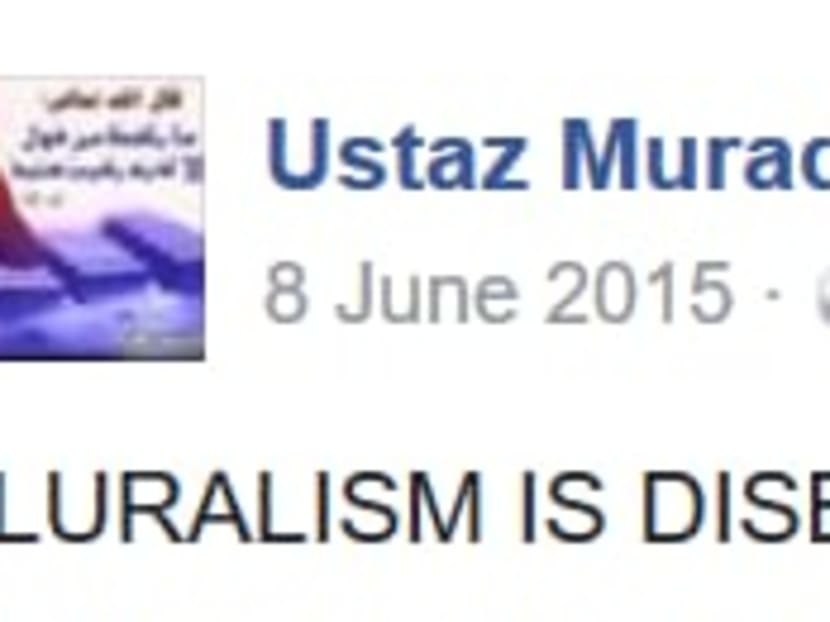Former ustaz was spreading extremist ideas on Facebook
SINGAPORE — In his Facebook post back in June 2015, Murad Mohd Said, then a freelance Islamic religious teacher, said that pluralism is contrary to Islamic teachings.

One of Murad Mohd Said's Facebook posts read: The prophet did not make the opening of Mecca as a national day or a day of independence. Is your country more honourable than Mecca?
SINGAPORE — In his Facebook post back in June 2015, Murad Mohd Said, then a freelance Islamic religious teacher, said that pluralism is contrary to Islamic teachings.
He also cautioned followers against taking part in interfaith dialogues. “Pluralism is disbelief (sic); Beware of interfaith dialogues!,” he wrote.

In a Facebook post on June 8, Murad Mohd Said cautioned followers against taking part in interfaith dialogues. Photo: Facebook screengrab
On Wednesday (Jan 16), the Ministry of Home Affairs (MHA) said that Murad, who is now 46 years old, has been placed on a Restriction Order under the Internal Security Act since Dec 5 last year, for spreading exclusivist and extremist teachings that promote violence.
He was accredited as a freelance religious teacher by the Islamic Religious Council of Singapore (Muis).
In another Facebook post on March 7, 2016, Murad mentioned the teachings of several Islamic scholars — written in Arabic and translated into Malay — who claimed that it is “compulsory” to kill apostates, or those who have renounced their faith.
A few months later that same year, on Aug 9, Murad seemed to question why Muslims in Singapore celebrate the country’s National Day in his Facebook message.
These were just some of the views he was propagating on his Facebook account, which has been deactivated.
Murad’s student, 56-year-old technician Razali Abas, who met him in 2012 and started attending his classes, was also placed under a Restriction Order last October to “prevent him from continuing his downward spiral into extremism”.
In response to TODAY’s queries, Muis said that Murad was accredited before the Asatizah Recognition Scheme was made mandatory in January 2017. Prior to that, asatizah — or religious teachers — may get accreditation on a voluntary basis.
Started in 2005, the accreditation scheme recognises teachers and scholars who meet the minimum standards of qualification to preach and teach Islamic religious knowledge.
Muis did not comment on when it was alerted to Murad’s teachings, only saying that he was repeatedly counselled after they were informed of his actions. However, he “did not change his views”, it added, so he was struck off the Asatizah Recognition Scheme last May.
In a separate statement on Wednesday, Muis said that in 2017, it introduced a code of ethics under the scheme as a form of guidance for religious teachers.
It also works with the authorities to ensure “objectionable materials which propagate such teachings are not used in religious classes in schools”.
“This system has ensured that the community receives religious teachings and guidance compatible with Singapore’s context,” Muis said.
Dr Nazirudin Mohd Nasir, Muis’ senior director of religious policy and development, said in the statement that in the cases of Murad and his student, they are examples of how individuals misrepresented religious ideas “by taking them out of context and fitting them into a radical agenda that promotes violence and killing”.
“For example, the Quran (Islam’s holy book) clearly promulgates freedom of belief and leaves it to the individual to accept the religion out of his or her own conscience,” Dr Nazirudin said.
He noted that Prophet Muhammad had called others “to his faith through good words and deeds” and also lived alongside non-Muslims as a single community, “whose rights to their own beliefs and practices were protected by the Prophet through a covenant or social contract”.
“The idea that apostates or non-believers can be killed is misguided and erroneous, and has been exploited by radical groups to justify their indiscriminate killings,” Dr Nazirudin said. “There must be no place for such ideas in our multi-religious society in Singapore.”









